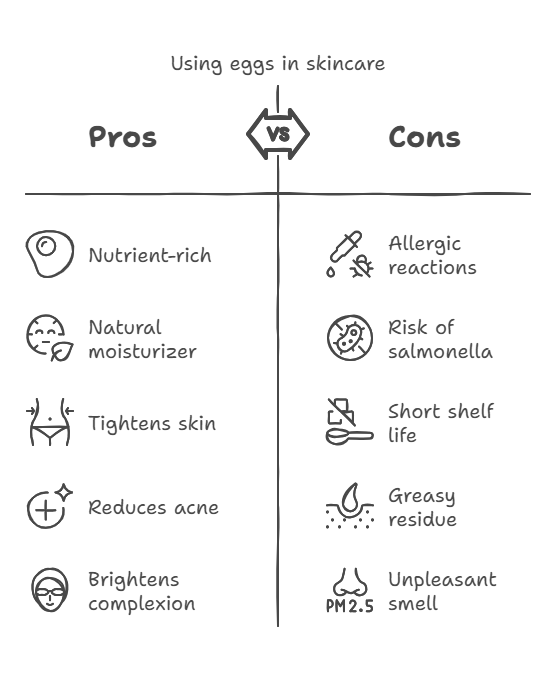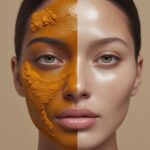- Eggs have been used historically in skincare for their potential benefits like tightening pores and providing nourishment.
- Raw eggs pose risks such as bacterial contamination and allergic reactions, so safety precautions are crucial.
- Egg whites can help with acne-prone or oily skin due to their astringent properties, while yolks suit dry or mature skin types.
- More scientific research is needed to fully understand the effectiveness and safety of using eggs in skincare routines.
- Always consult a dermatologist before trying new remedies and balance DIY treatments with professional skincare products.
Who would’ve thought that the humble egg—yes, the same one you scramble up for breakfast—could be a secret weapon for glowing skin? Beyond being a kitchen staple, eggs have quietly made their way into skincare routines for centuries. From tightening pores to delivering a dose of nourishing vitamins, eggs offer potential benefits that are hard to ignore. But here’s the catch: they’re not without risks, and not everyone’s skin plays nice with them.
In this article, we’ll dive deep into what experts have to say about using eggs in skincare. We’ll explore the benefits, drawbacks, safety tips, and the science behind it all.
The Historical Use of Eggs in Skincare
For generations, eggs have been celebrated for their healing properties, whether consumed or applied topically. According to Refinery29, “Eggs have been revered for their healing benefits, whether by consumption, applying eggs as face masks, or even rolling boiled eggs to help heal bruises.”
While ancient practices may lack modern scientific validation, they highlight the long-standing belief in eggs’ ability to promote skin health.
Understanding this history provides context for today’s discussions around egg-based skincare. As we move forward, it’s important to evaluate these claims through the lens of current research to ensure safety and efficacy.
Raw Egg Safety Concerns
One of the biggest concerns when using eggs in skincare is the risk of bacterial contamination. Cosmetic chemist King warns,
“Raw egg yolks can harbor bacteria, including salmonella.”
Salmonella poses a significant health hazard, especially when raw eggs are applied directly to the skin. This reminder emphasizes the importance of proper hygiene and sterilization when working with eggs.
If you’re thinking about adding raw eggs to your routine, consider opting for pasteurized versions or alternative formulations that eliminate raw ingredients altogether.

Antimicrobial Properties of Egg Whites
Egg whites are often praised for their antimicrobial and anti-inflammatory properties, making them an appealing option for acne-prone skin. A trusted source notes,
“Egg whites have some antimicrobial benefits and also act as an anti-inflammatory.”
These qualities suggest that egg whites might help combat acne-causing bacteria and reduce redness or irritation. That said, it’s worth noting that these effects are temporary and should complement—not replace—conventional treatments. For example, while an egg white mask might provide immediate relief, it won’t address underlying hormonal imbalances or severe acne conditions. Always pair DIY remedies with proven methods for best results.
Risks of Allergic Reactions
Not everyone reacts well to eggs, even in skincare. A dermatologist cautions, “It causes the skin to react negatively,” highlighting the potential for allergic reactions. Even though eggs are widely used in recipes and beauty products, they can irritate sensitive skin types, leading to discomfort or inflammation.
Before trying any new ingredient, perform a patch test to ensure compatibility. If you’re unsure about how your skin will respond, consulting a dermatologist can help you make an informed decision. After all, personalized care is key to achieving healthy, glowing skin.
Nutrient-Rich Egg Yolks
On the flip side, egg yolks are packed with nutrients that can deeply nourish the skin. A reliable source explains, “Egg yolks provide deep nourishment with essential vitamins like A and E.” Vitamin A supports cell turnover, promoting a brighter complexion, while Vitamin E acts as a powerful antioxidant, protecting the skin from environmental stressors.
While egg yolks are great for dry or mature skin, overuse could clog pores or exacerbate oily skin conditions. To avoid this, balance their application with other moisturizing agents. Moderation is key to reaping the benefits without compromising skin health.

DIY Masks for Tightening Pores
Another popular use of egg whites involves creating DIY masks designed to tighten pores. As noted, “Egg whites are slightly astringent and can help tighten pores.” This effect creates a smoother appearance and minimizes the look of enlarged pores, making egg whites a go-to choice for many at-home treatments.
However, frequent use of egg white masks without proper hydration can strip the skin of natural oils, leading to dryness or flakiness. To counteract this, follow up with a lightweight moisturizer or serum to restore balance. Additionally, remember that pore management requires a holistic approach—exfoliation and cleansing play crucial roles too.
Calcium from Eggshells
Beyond the egg itself, its shell holds potential benefits for skincare. One dermatologist remarks, “Eggshells are a surprising source of minerals, with calcium taking the spotlight.” Calcium strengthens the skin barrier, enhancing resilience against external aggressors.
Crushed eggshells can be incorporated into scrubs or masks to deliver mineral-rich benefits. But preparation is key—boiling or sterilizing the shells beforehand eliminates bacteria and ensures safe usage. With a little extra effort, you can harness the power of eggshells in your routine.
Hair Regrowth Potential
In addition to skincare, eggs are frequently used in hair treatments due to their high protein content. Some experts believe, “Egg yolk masks may be beneficial for hair regrowth but require proper extraction and preservation.” Proteins found in egg yolks nourish hair follicles, potentially stimulating growth and improving overall hair health.
That said, the effectiveness of egg-based remedies for hair regrowth remains largely anecdotal. Scientific studies supporting these claims are limited, so approach them with caution. Proper handling and storage are also critical to preventing spoilage and bacterial contamination.
Addressing Specific Skin Conditions
Individuals with specific skin conditions, such as psoriasis, eczema, or acne, must exercise caution when incorporating eggs into their routines. Dr. Bradford Patt advises, “If you have skin conditions such as psoriasis, eczema, or acne, eggs alone may not cure the issues.” Instead, professional treatments tailored to individual needs often yield better results.
This insight reinforces the idea that eggs serve as complementary tools rather than standalone solutions for complex skin concerns. Consulting a licensed dermatologist ensures access to evidence-based therapies capable of addressing root causes effectively.
Scientific Validation Needed
Finally, much of the enthusiasm surrounding eggs in skincare stems from traditional practices rather than robust scientific evidence. A dermatology journal states, “While eggs show promise in certain areas, more research is needed to confirm their efficacy.” Until comprehensive studies validate these claims, remain skeptical of exaggerated promises and focus on proven methods.
By prioritizing science-backed solutions, you can make informed decisions about your skincare choices. Combining empirical data with expert guidance empowers you to achieve healthier, more radiant skin safely and effectively.
What the Latest Research Says About Eggs in Skincare
Skincare trends come and go, but eggs have been sticking around for a while now. So, how do they stack up against the latest science? To give you the full picture, I’ve pulled together some recent studies and expert insights to help reinforce why eggs might or might not be worth trying in your routine.
First off, a study from the American Institute of Science points out that egg whites are packed with protein, vitamins, minerals, and antioxidants. These ingredients can nourish your skin and even improve its texture over time. Sounds pretty great, right? But here’s the thing: just because something works when you eat it doesn’t always mean it’ll work magic on your face.
Now, let’s talk risks. Healthline reminds us that while cooked egg whites are totally fine to eat, slathering raw ones on your skin isn’t without its downsides.
Raw eggs can carry bacteria like salmonella, which no one wants hanging out on their face.
Plus, another source notes that any benefits you get from an egg white mask are probably temporary and maybe even exaggerated.
But here’s the kicker: there’s still not enough hard science backing up all those DIY egg mask claims. A dermatology journal puts it plainly: “While eggs show promise in certain areas, more research is needed to confirm their efficacy.”
So, where does that leave you? Well, if you’re curious about giving eggs a try, go for it; but play it safe. Use pasteurized eggs, patch test first, and keep an eye out for irritation. Oh, and don’t forget to chat with a dermatologist if you’re unsure. After all, your skin deserves the best care possible!

I’m a devoted organic skincare enthusiast, passionate about the natural, wholesome goodness that organic products bring to our skin.
Organic skincare isn’t just a hobby for me—it’s a lifestyle. Every product I use, recommend, and write about has been carefully chosen for its purity and effectiveness. Everything I write about is backed by scientific studies, dermatologists’ opinions, and user experiences.
I also excel at tackling skincare challenges with innovative, organic solutions.

